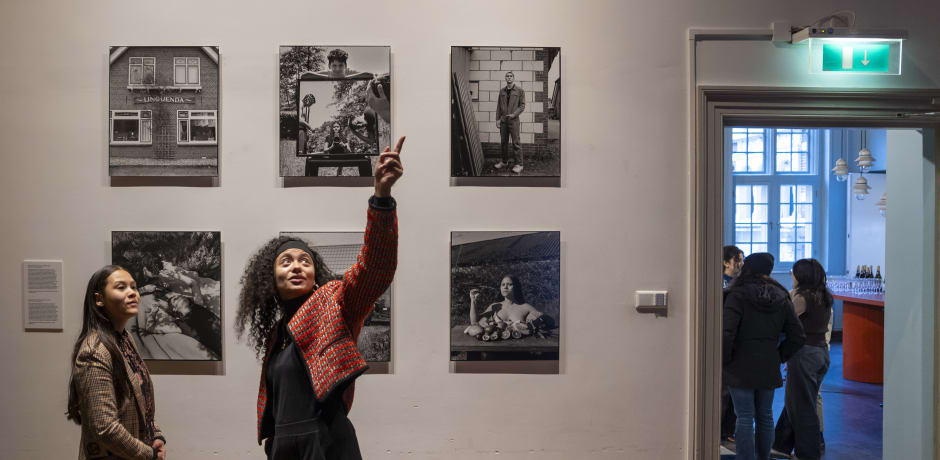
Artists exhibit in VOC hall on UvA colonial past: “It’s time for practical steps”
Last week an exhibition on the colonial past at the UvA opened in the VOC Hall of the Bushuis. This was in response to discomfort among students and staff about the 1997 reconstruction of the VOC Hall. “A change in this hall would be a symbolic step toward decolonization UvA-wide as well.”`
It smells like nutmeg in the VOC room in the Bushuis where the exhibition If these walls could speak opened last Friday. Instead of the green table with 17 chairs, there is now a colorful tablecloth with a thick black book in the middle representing the black pages of Dutch history. Before it, only one lone chair still stands, instead of the 17 chairs that refer to the ‘Heren XVII,’ the directors of the VOC who met here twice a year to decide the fate of an estimated 660,000 to 1,000,000 slaves.

“The hall evokes an uneasy feeling among many students,” says Lateesha Verwey, master’s student at the UvA and curator of the exhibition on the VOC hall, which until last August was still being used for lectures, meetings and graduation ceremonies at the UvA. “I, too, feel uneasy and unwelcome when I see the glorification of the Golden Age.”
For that reason, an exhibition has now opened, the culmination of the public program Decolonial Dialogues@Humanities, which includes lectures, film evenings, and panel discussions that the Faculty of Humanities organized last year in response to growing discomfort about the hall among students and staff.
Tablecloth on tour
Five artists were chosen to engage in a dialogue with the VOC Hall. Dutch-Moluccan artist Esli Tapilatu did so quite literally, taking the tablecloth he made to the Cape of Good Hope castle in Cape Town where the Netherlands held about 60,000 enslaved people between 1658 and 1795. Tapilatu invited local kings and queens in Cape Town to sit at the table and share stories and incorporated that into one half of the woven tablecloth. After the exhibition at the UvA, he will take the tablecloth to Banda Neira, Holland’s first colony in the Indonesian archipelago, to sit down with locals.
Final report
All the experiences of the Decolonial Dialogues@Humanities will be compiled into one report after the final symposium on January 24th, which will be presented as advice to the UvA Board. Verwey says: “Opinions are divided, but what everyone does agree on is that the VOC hall cannot remain as it was. Something must be done to bring context, and more than just a sign. Either through a permanent exhibit on decolonization, or, as some suggest, the entire reconstruction of the VOC Hall should be removed from the Bushuis and turned into a regular meeting room.”
Verwey continues: “Whatever comes out of it, I hope the UvA will do something with it. After years of talk, it’s time to take practical steps. A change in this hall would be a symbolic step toward decolonization UvA-wide as well.”
The exhibition If these walls could speak can be viewed free of charge from December 1st, 2023 to January 31st, 2024 in the VOC Hall of the Bushuis/Oost-Indisch Huis at Kloveniersburgwal 48.



